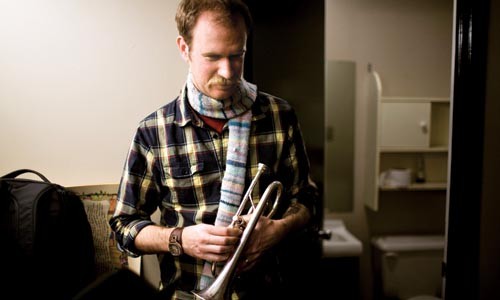Charles Spearin is a founding member of the Canadian post-rock band Do Make Say Think and a supporting character in the revolving cast of Broken Social Scene. Earlier this year, he released a concept album, The Happiness Project, in which he set snippets of interviews with neighbors to music, using the rhythms and melodies of the field recordings as the basis for the (largely jazz-oriented) songs. Spearin spoke with City Paper from his Toronto home, in advance of a Happiness Project and Do Make Say Think performance Wed., Dec. 2, at Brillobox.
Where did the idea for The Happiness Project come from, and how did it get off the ground?
For a long time I've wanted to see if I could take some of the accidental melodies of normal speech and arrange them into songs. I guess part of it could be that I travel quite a bit as a musician, and going to places like Europe where you don't speak the language, you begin to really pick up on the sing-song quality of people's voices.
I decided to invite my neighbors over to my house and see if I could find some melodies in their voices. We would talk about life, and I'd try to steer the conversation toward something that was meaningful, and happiness seemed like a good subject. ... I had to find a way of balancing the meaning of the words with the melody of the words and became sort of the crossword puzzle of the project.
One of the first things I thought of when I heard it was Steve Reich.
Yeah, Different Trains! I had for a while noticed the musicality of voice and thought it would be neat to make songs of it. Then when I heard Different Trains, that put some wind in my sails -- it was really mesmerizing the way it was done. But I wanted to do something that was a little more lighthearted and a little more thorough, following the thread of the conversation.
In general, do you think that we write music to mimic speech patterns, or do we speak in ways that mimic music?
I think that certain intervals -- the distance between two notes, like, the theme from Jaws is a semitone -- each of these intervals, whether it's harmonic or melodic, has a certain emotional quality to it. The classic example is Beethoven's Fifth -- it's only two notes, but there's a lot of weight to that, and people are unconsciously aware of the power of these intervals, and they incorporate them into their speaking all the time. Their voice rises to major thirds and minor thirds, and it's funny how musical people are without really knowing it. They might think they can't sing, but they're singing all the time, in the way they speak.
On some of the tracks -- I'm thinking of "Ondine," with the little girl talking about the almond butter -- there are almost comical, whimsical moments.
Right, that's my daughter.
Was that something you wanted to keep front and center?
Yeah, I think I wanted to keep it somewhat light, partly because in what I had heard, for example with Steve Reich, I think that's kind of heavy-handed, though it's an amazing and beautiful piece. There's opportunity for all of it in there -- going back to intervals and voice; there's humor in the melody and also some sadness, all different emotional qualities that could be exploited, for lack of a better word, to say what you're trying to say.
How did your neighbors react?
They were quite happy to come over and talk -- that was the easy part. Once it was finished, I gave them all a copy and sat down with them and listened. Some of them understood more than others; I think a lot of them thought it was kind of weird, but still nice. [Laughs]
But when we did the first live performance in Toronto, I invited them all down. Afterwards some of them came up to me and said they didn't really understand the project until they had seen it live. They really enjoyed it. Mrs. Morris even called me the next day and said she felt like a newborn baby being passed around, she was getting so many hugs from my friends.
The Happiness Project, opening for Do Make Say Think with Years. 9 p.m. Wed., Dec. 2. Brillobox, 4104 Penn Ave., Bloomfield. $12. 412-621-4900













